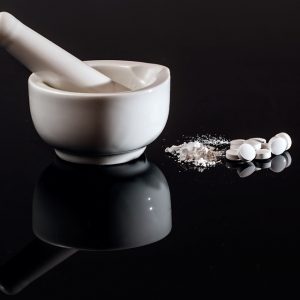
Hair loss can be caused by many different conditions such as chemotherapy-induced alopecia, androgenetic alopecia (male pattern baldness) and alopecia areata (spot baldness). Alopecia areata or ‘spot baldness’ is an autoimmune disease where actively growing hair follicles are attacked by the body’s own immune system1. This condition can lead to total scalp hair loss (alopecia totalis) or total scalp and body hair loss (alopecia universalis)2. Alopecia areata is a relatively common form of hair loss, second to androgenetic alopecia3.
As alopecia areata can impact the quality of life, potential treatments for this hair disorder have been examined4. For instance, ruxolitinib has been recently evaluated5. Ruxolitinib is currently approved to treat disease of the bone marrow (e.g., myelogibrosis)6. In a recent open-label clinical trial, 12 moderate to severe alopecia areata patients were given 20 mg of ruxolitinib, twice a day for 3 to 6 months5. At least 50% hair regrowth occurred in 9 of these patients by week 12 and 7 of these patients obtained over 95% regrowth by the end of treatment5. Bacterial skin infection, upper respiratory tract infection, and urinary tract infection are some of the adverse effects reported in this study5.
Ruxolitinib is just an example of the many off label emerging therapies being developed. Other off-label therapies for alopecia areata include topical or systemic steroids, and topical immunotherapies7. Talk to your doctor if you are interested in finding out more information on hair loss treatments.
Article by: Sarah Versteeg MSc, Mediprobe Research Inc.
- Paus R, Slominski A, Czarnetzki BM. Is alopecia areata an autoimmune-response against melanogenesis-related proteins, exposed by abnormal MHC class I expression in the anagen hair bulb? Yale J Biol Med. 1993 Dec;66(6):541–54.
- Islam N, Leung PSC, Huntley AC, Gershwin ME. The autoimmune basis of alopecia areata: a comprehensive review. Autoimmun Rev. 2015 Feb;14(2):81–9.
- Alkhalifah A, Alsantali A, Wang E, McElwee KJ, Shapiro J. Alopecia areata update: part II. Treatment. J Am Acad Dermatol. 2010 Feb;62(2):191–202, quiz 203–4.
- Masmoudi J, Sellami R, Ouali U, Mnif L, Feki I, Amouri M, et al. Quality of life in alopecia areata: a sample of tunisian patients. Dermatol Res Pract. 2013;2013:983804.
- Mackay-Wiggan J, Jabbari A, Nquyen N, Cerise J, Clark C, Ulerio G, et al. Oral ruxolitinib induces hair regrowth in patients with moderate-to-severe alopecia areata. JCI Insight. 2016 Sep 22;1(15):e89790.
- Jakafi (ruxolitinib) tablets, for oral use [Internet]. U.S. Food and Drug Administration. 2016 [cited 2016 Oct 10]. Available from: http://www.accessdata.fda.gov/drugsatfda_docs/label/2016/202192s012lbl.pdf
- Delamere FM, Sladden MM, Dobbins HM, Leonardi-Bee J. Interventions for alopecia areata. Cochrane Database Syst Rev. 2008;(2):CD004413.












